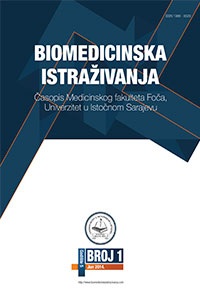The incidence of anxiety in patients with chronic subjective tinnitus
DOI:
https://doi.org/10.5937/BII2101019KAbstract
Introduction. Tinnitus is a perception of a sound in the ears
in the absence of acoustic stimulation whose pathophysiological
mechanisms have not been evaluated yet. Approximately,
1–2% of people report distress which can negatively affect
their daily performance. Our study aimed to assess the incidence
of anxiety in patients with tinnitus.
Methods. The study was designed as a cross-sectional study.
The participants were divided into two groups: a group of 73
patients with tinnitus (with two subgroups in relation to the
duration of tinnitus - less than one year and more than one
year) and a control group of 43 patients without tinnitus. We
examined the presence of anxiety in all patients using the
Burns Anxiety Inventory (BAI). The quality of life of all patients
was estimated by Tinnitus Handicap Inventory (THI).
Results. In the group of patients with tinnitus, 56.2% of them
had mild and 24.7% moderate hearing loss, while 27.7% of respondents
from control group had mild and 8.5% moderate
levels of hearing impairment. THI results showed that patients
with tinnitus less than 1 year had a significantly (p= 0.002)
higher level of disorders in daily life, compared with the group
who had tinnitus for more than 1 year. The 30.8% of respondents
had minimal anxiety, 26.7% borderline anxiety, 17.5%
mild anxiety, the same percentage of respondents moderate,
5% severe, while 2.5% had extreme anxiety based on BAI.
Conclusion. Anxiety can be considered as potentially significant
modulators of changes in brain structures observed in
people with tinnitus.

